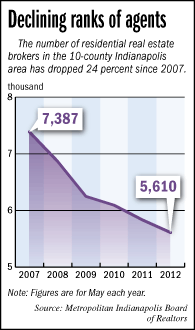Subscriber Benefit
As a subscriber you can listen to articles at work, in the car, or while you work out. Subscribe NowThese days, you don’t need a residential real estate agent to find out which homes are for sale, or to find out how much homes are selling for in a given neighborhood.
 You can tour homes online via photo galleries and virtual tours, use Google Street View to find out what shops and restaurants are nearby, and check prior sales and walkability scores on Zillow.
You can tour homes online via photo galleries and virtual tours, use Google Street View to find out what shops and restaurants are nearby, and check prior sales and walkability scores on Zillow.
In fact, the Internet—not a residential broker—is the first point of contact for more than 80 percent of home buyers and sellers, data from F.C. Tucker shows.
That presents a challenge for an industry still coping with the effects of the housing downturn and a resulting 24-percent reduction in the ranks of central Indiana Realtors since 2007.
Yet full-service residential agents are holding market share in part by acting more as advisers, counselors and interpreters of data rather than gatekeepers. They’re taking a more active role in shepherding what can be a tricky financing, inspection and closing process, and connecting buyers and sellers with other service providers, including contractors and movers.
“Competition always makes the good better and forces the industry to look in the mirror,” said Debbie Morris, president of the Metropolitan Indianapolis Board of Realtors. “At the end of the day, nothing is like your home. For most people, it’s the single biggest expense of their life and their largest investment, and they still want to have a trusted source advising them during the process.”
As buyers and sellers do more of their own research, including scouring listings for promising properties, brokers can be more productive at work or spend more time with their families, Morris said. It also means fewer open houses since buyers can check out photos any time, day or night.
On the flip side is a spreading concern that Internet competitors could pose an existential threat to the industry. Fewer open houses make it even less likely that an agent will be the first point of contact for a buyer or seller.
Discount brokers and websites that facilitate for-sale-by-owner transactions are taking advantage of a thirst for deals and the practical reality that many owners have little or no equity and can’t afford the traditional commission of 6 percent to 7 percent of the sale price.
“The founders of Zillow were also the founders of Expedia,” Morris noted. “From an industry perspective, you have to look at what’s happened with the travel agencies.”
Embracing technology
Jim Litten, president of F.C. Tucker Co., the city’s largest residential brokerage, sees the wealth of data on the Internet more as an empowerment to consumers than a threat to brokers.
Sure, buyers use online listings to rule out properties and sellers use them to check up on their competition. But unlike in commercial real estate, where the numbers either work or they don’t, there’s still a stronger dose of emotion in residential transactions.
For brokers, the most labor-intensive part of a transaction comes after an offer is written and accepted.
“You still need an agent who knows the values and the neighborhoods, how to get through the inspection process, how to arrange financing,” Litten explained. “Information certainly is part of it, but in my opinion that’s not the part of it when the agent shines.”
Tucker and its competitors have taken aggressive steps to capitalize on technology and maintain relevancy including with new iPhone and iPad applications and social networking. Tucker spends $1 million a year on talktotucker.com, Litten said.
Meanwhile, brokers have cut back on direct-mail marketing and have almost eliminated classified advertising.
At the end of the day, selling residential real estate is a face-to-face, relationship business, Litten said.
“Technology is a tool to make us more efficient,” he said. “Technology is not making sales.”
Shifting priorities
 Broker Jimmy Dulin is combating the rise of the Internet by offering more services. Not only is Dulin scheduling movers and helping find remodeling contractors for clients, but he also combs through online data to determine its accuracy. (IBJ Photo/ Perry Reichanadter)
Broker Jimmy Dulin is combating the rise of the Internet by offering more services. Not only is Dulin scheduling movers and helping find remodeling contractors for clients, but he also combs through online data to determine its accuracy. (IBJ Photo/ Perry Reichanadter)The technology shift means residential agents are spending less time researching listings and showing homes and more time providing other services, said Jimmy Dulin, broker/owner of Re/Max Ability Plus, which has five offices and 120 agents serving Carmel, Fishers, Zionsville and Indianapolis.
Dulin has found himself scheduling movers, securing contractors for home remodels, and arranging for the purchase and delivery of new appliances.
Also time-consuming: vetting data that buyers and sellers find on third-party websites like Zillow that is often out of date or just plain inaccurate. On the listing side, sellers expect their homes listed all over the Internet, another process that can be time-consuming—and expensive.
Finally, closings can be trickier than in the past due to thorny financing issues and government-regulated disclosure documents.
Dulin said commissions have held steady. He credits the wider array of services and an understanding among buyers and sellers that they need professional advice to truly understand a home’s value.
“I believe in general that most folks are of the mind-set that they’d rather hire an experienced, qualified person to take them through a difficult transaction,” said Dulin, who is looking to downsize into a smaller office, since many of his agents now operate their business remotely.
“Most people aren’t against paying, as long as they feel like they got a value for paying,” he added. “You can do a lot of things yourself, but an agent is going to add value to the transaction in different ways, not just with data.”
Improving fortunes
Residential agents are encouraged by an uptick in home sales this year despite the absence of government incentives other than low interest rates.
The increased activity is helping a smaller posse of Realtors: There are 5,600 residential brokers in the 10-county central Indiana region served by the Metropolitan Indianapolis Board of Realtors, down from a peak of 7,400 in 2007.
Plenty of older brokers have retired and low-producing ones left the industry as a 30-percent drop in home sales during the downturn made it economically unfeasible to continue paying dues. Few new agents are entering the business, despite relatively low barriers to entry.
With fewer dues-paying members, MIBOR has had to streamline operations but has avoided job cuts.
Business is booming for Vern Carter, who started locally based Flat Fee Realty in 2007 and now has four agents working for him.
The firm represents both buyers and sellers, taking a traditional 3-percent or so commission when it represents buyers and charging a flat fee of $599 to represent sellers.
The rationale: Buyers’ agents do the heavy lifting of a home sale, he said, while listing agents “simply put it on the Internet.”
“Why is it necessary for us to stick to a commission structure when some sellers don’t have enough equity to sell their homes?” he asked. “A lot of agents create a lot of fluff factor about doing a lot of work. I used to work at Century 21 so I know exactly what it takes.”
Of course, there’s a catch. A swing-post sign or lockbox allowing other agents to show your house will cost you extra. Plus, the $599 includes only three hours of broker time to post the listing, present offers and counter-offers, answer questions, and attend closing.
A-game
Another catch to the discounters is that full-service agents have to pick up the slack for those who just post a listing and a sign and bow out, said Jeff Kucic, the broker/owner of luxury home specialist Kucic Associates.
“You get what you pay for,” said Kucic, who added that deals are as complex as ever to close, with pre-approvals virtually meaningless and contingent offers passé. “You better be on your A-game on service because that’s all you have to offer.”
To Kucic, the only thing scarier than the new crop of discounters is Zillow, which takes home listings procured by Realtors and sells the leads they produce back to Realtors.
The upshot is, Zillow doesn’t stand behind the data, which is not as up-to-date as what’s available to agents.
“You still need someone with local knowledge and experience to get the deal,” Kucic said. “You still can’t just buy a house right off the Internet.”•
Please enable JavaScript to view this content.
